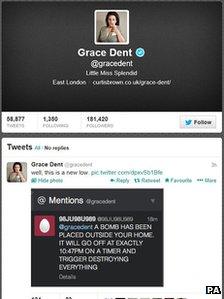Bomb threat tweet sent to classicist Mary Beard
- Published

Prof Beard has spoken in the past about abuse she received online
The classicist and TV presenter Mary Beard has been sent a bomb threat on Twitter hours after the UK boss of the social networking site apologised to women who have experienced abuse.
Prof Beard, who has faced abuse on Twitter previously, told the BBC she had reported the new message to police.
It used similar wording to a tweet sent earlier to a number of women, some of whom have also received rape threats.
A number of Twitter users say they are boycotting the site for 24 hours.
Prof Beard spoke earlier this year about the online abuse she had received after appearing on the BBC's Question Time.
And this week said she revealed she had received an apology from a so-called Twitter troll who sent her an offensive message on Monday, after she retweeted the remark.
'Particularly unpleasant'
Writing on Twitter on Saturday, Prof Beard said the bomb threat was reported to "make sure" another case was logged by police.

Journalist and broadcaster Grace Dent highlighted the bomb threat
Prof Beard told BBC Radio 5 live: "I think it is scary and it has got to stop.
"To be honest I didn't actually intellectually feel I was in danger but I thought I was being harassed and I thought I was being harassed in a particularly unpleasant way."
A Twitter spokeswoman said the company did not comment on individual accounts.
On Friday, the Metropolitan Police said its central e-crime unit was investigating allegations by eight people of "harassment, malicious communication or bomb threats" suffered on Twitter.
Two people have been arrested in relation to rape threats against Labour MP Stella Creasy and feminist campaigner Caroline Criado-Perez, who received the messages after a campaign to have Jane Austen on the new £10 note.
The Guardian's Hadley Freeman, the Independent's Grace Dent and Time magazine's Catherine Mayer all said they had received identical bomb threats on Wednesday.
The Twitter boycott began at midnight and was proposed by the journalist Caitlin Moran as a way of doing "something symbolic" on International Friendship Day in the wake of the escalating incidents of abuse on Twitter.
In a blog entry,, external Ms Moran, who herself received an abusive tweet on Saturday, said the boycott was being staged in a "spirit of solidarity - to show what Twitter would be like if the trolls over-run this place".
Updated rule
Twitter UK boss Tony Wang has said the threats were "simply not acceptable" and pledged to do more to tackle abusive behaviour.
The revelations of threats sparked a backlash online, with more than 125,000 people backing a petition calling for Twitter to add an easy-to-use "report abuse" button to tweets.
Twitter has updated its rules and confirmed it would roll out an in-tweet "report abuse" button already available on the Apple iOS Twitter app to all platforms, including desktops.
In a series of tweets, external, Twitter UK general manager Mr Wang said: "I personally apologize to the women who have experienced abuse on Twitter and for what they have gone through.
"The abuse they've received is simply not acceptable. It's not acceptable in the real world, and it's not acceptable on Twitter.
"There is more we can and will be doing to protect our users against abuse. That is our commitment."
In an earlier message posted on the Twitter UK blog, external, the company's senior director for trust and safety, Del Harvey, and Mr Wang said the company had clarified its anti-harassment policy in light of feedback from customers.
Twitter has clarified its guidance on abuse and spam - reiterating that users "may not engage in targeted abuse or harassment".
The bosses said in the blog that additional staff were being added to the teams that handle reports of abuse and the company was working with the UK Safer Internet Centre, which promotes the safe and responsible use of technology.
- Published3 August 2013
- Published3 August 2013
- Published30 July 2013
- Published29 July 2013